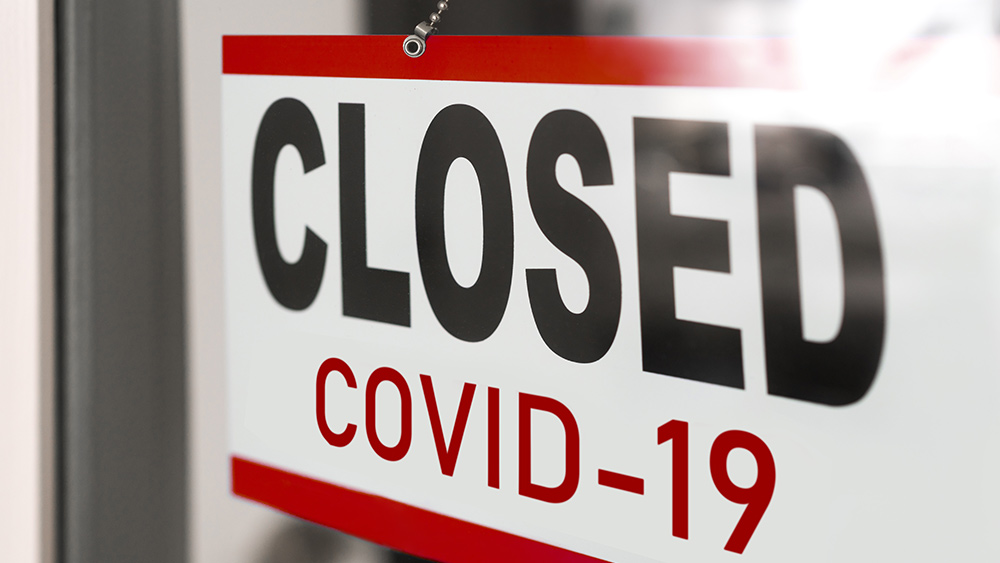Report: States that imposed lockdown have more COVID-19 deaths per million compared to no-lockdown states
02/17/2021 / By Nolan Barton

A recent analysis of public data showed that the states that imposed a lockdown over the fall and winter because of the Wuhan coronavirus pandemic have 5.6 percent more deaths per million compared to the 11 states that did not impose a lockdown.
The states that did not impose a lockdown were Texas, Florida, North Dakota, South Dakota, Arkansas, Iowa, South Carolina, Georgia, Wyoming, Nebraska and Utah.
U.K.-based website Lockdown Sceptics quickly pointed out that the models predicting massive death tolls on states not imposing a lockdown because of the pandemic proved to be wrong.
The website was apparently referring to a model published last year by Neil Ferguson of Imperial College of London, which predicted 2.2 million American deaths from COVID-19. White House coronavirus advisers, Dr. Anthony Fauci and Dr. Deborah Birx, presented Ferguson’s model to then President Donald Trump.
This prompted Trump to release a coronavirus guideline, also known as “15 Days to Slow the Spread,” which encouraged school operations to stop and restaurants, bars and other outdoor venues where groups of people congregate to close.
“If the doomsday models are correct, why don’t the bars for those (11) states clearly stand out from the bars of the lockdown states?” the website asked. “Furthermore, why are the top five states for COVID deaths lockdown states?”
Lockdown Sceptics was referring to the top five states with the most number of deaths per million – New Jersey, New York Massachusetts, Mississippi and Rhode Island. Those states have imposed winter lockdown.

“If anything this suggests lockdown made things worse. At any rate, there’s no sign it helped,” the website said.
The website also challenged lockdown proponents to put their models to test in the real world.
“Time to put up or shut up. Either their models can reproduce the outcomes of real states which don’t lock down, or they can’t and need to be fundamentally revised. No more hiding behind counterfactuals of ‘it would have happened but for lockdown.’ The facts are here and waiting to be explained.”
The same trend seemed to be happening outside the United States, as well.
Lockdown Sceptics noted the London Telegraph‘s Alexander Fiske-Harrison reported that the European countries “with the strictest lockdowns have come out no better.” (Related: Data audit shows devastating effects of UK lockdown.)
The WND also reported that a Canadian infectious-disease specialist who initially supported the lockdowns in response to the coronavirus has changed his mind, concluding in his peer-reviewed study that the harm is 10 times worse than the benefits.
In contrast, a top coronavirus adviser for President Joe Biden became a proponent of lockdown after initially batting for no lockdown.
Michael Osterholm, a professor and director of the Center for Infectious Disease Research and Policy at the University of Minnesota, warned in a Washington Post op-ed in March last year about the high economic and social costs of “the near-draconian lockdowns” in effect at the time in China and Italy.
He changed his tone last November, advocating a national lockdown of four to six weeks.
Previous study finds states with early lockdown measures have lower death rates later
The new analysis showing no-lockdown states faring better than states that imposed lockdown contradicted the findings of a study made by Rice University‘s Baker Institute late last year, which showed the states that imposed strict lockdown measures early on in the COVID-19 pandemic saw lower death rates later.
According to that study, the states with more deaths early on tended to impose stricter restrictions. Their actions seemed to pay off several months later as those same states had lower COVID-19 deaths than states with more lax restrictions earlier in the pandemic.
“It was the May restrictions that affected and lead to lower deaths all the way through fall,” said Vivian Ho, chair of health economics for Rice University’s Baker Institute. “What it’s telling us is that, perhaps, early measures matter. What you do early on could have very important implications for deaths many, many months down the road.”
Ho admitted they could not draw a causal relationship from this data.
“You really can’t say whether it’s strictly the state lockdowns or people’s response to how bad things were,” Ho said. “Lockdowns do work. We can’t say why they work, but they are effective.”
Follow Pandemic.news for more news and information related to the Wuhan coronavirus pandemic.
Sources include:
Tagged Under: covid-19, Dr. Anthony Fauci, Dr. Deborah Birx, lockdown, pandemic, White House, Wuhan coronavirus




















